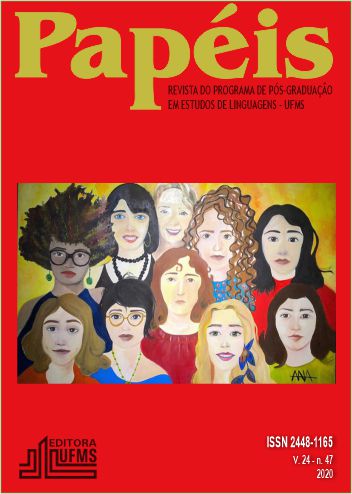A Plataforma Scholar e o Projeto Piloto USP-UIUC (Universidade de São Paulo e Universidade de Illinois em Urbana-Champaign): inovações em formação de professores
Resumen
Neste artigo descrevo e analiso alguns aspectos da plataforma Scholar, a partir da experiência de uma comunidade de professores, com o objetivo de identificar as habilidades de letramentos digitais do grupo de professores, em relação às funcionalidades da plataforma. Como método, usei como referências a etnografia de Blommaert e Dong (2010) e a proposta de observação participante de André (2012). Na plataforma Scholar temos a formação de comunidades virtuais nas quais as práticas e as interações dos participantes na comunidade são registradas a partir do uso de recursos como updates, fóruns e surveys. Apresento dados provenientes de levantamento bibliográfico, análise de documentos, observação das interações nos fóruns, questionários online, entrevistas semiestruturadas e observação do processo de construção de um módulo de aprendizagem. O contexto da pesquisa foi uma comunidade virtual composta por participantes de um projeto, em que tivemos 29 integrantes interessados em fazer a terceira edição do curso "(Multi)letramentos e formação de professores de línguas", correspondente ao Módulo I do projeto piloto. O curso ocorreu durante 5 semanas, na modalidade a distância, com dois encontros síncronos, um na primeira e outro na quarta semana. Em um primeiro momento, descrevo alguns aspectos da interface da plataforma, diretamente relacionados às interações na comunidade de professores. Nessa etapa, procurei elucidar alguns pressupostos epistemológicos do ambiente. Em seguida, analiso o uso da plataforma no contexto do Projeto Nacional de Letramentos. Os dados da pesquisa revelam que as habilidades de letramentos digitais para realizar o curso foram adquiridas com baixa necessidade de apoio técnico. Contudo, o uso da inteligência artificial e dos recursos de gestão de projetos e edição exigem maior reformulação de processos pedagógicos, como avaliação e revisão entre pares.
Citas
ABRANTES, Rodrigo; CANNATÁ, Verônica. Metodologias ativas: ensino híbrido. São Paulo, FTD, 2018.
ANDRÉ, Marli. Etnografia da prática escolar. Campinas, Papirus, 2012.
CAMARGO, Ailton; SILVA, Rodrigo. A cultura escolar na era digital: o impacto da aceleração tecnológica na relação professor-aluno, no currículo e na organização escolar. In: BACICH, Lilian; TANZI NETO, Adolfo; TRAVISANI, Fernando. Ensino híbrido: personalização e tecnologia na educação. Porto Alegre: Penso, 2015.
BUZATO, Marcelo. Cultura digital e apropriação ascendente: apontamentos para uma educação 2.0. Belo Horizonte, Educação em Revista, v. 26, n. 03, p. 283-304, dez. 2010.
CESARINO, Leticia. Identidade e representação no bolsonarismo: corpo digital do rei, bivalência conservadorismo- neoliberalismo e pessoa. São Paulo, Revista de Antropologia, v. 62, n. 3, p. 530-557, 2019.
CESARINO, Leticia. What the Brazilian 2018 elections tell us about post-truth in the neoliberal-digital era. Cultural Anthropology – Hot Spots, 2020. Disponível em: <https://culanth.org/fieldsights/what-the-brazilian-2018-elections-tell-us-about-post-truth-in-the-neoliberal-digital-era>. Acesso em: 3 fevereiro 2020.
COMMON GROUND. Disponível em: <https://cgnetworks.org/about/history>. Acesso em: 27 janeiro 2020.
COPE, Bill; KALANTZIS, Mary. Conceptualizing e-Learning. In: COPE, Bill. KALANTZIS, Mary. e-Learning ecologies, principles for new learning and assessment. New York, Routledge, 2017.
COPE, Bill; KALANTZIS, Mary; LIAM, Magee. Towards a semantic web – connecting knowledge in academic research. Cambridge, Chandon Publishing, 2011.
COPE, Bill; KALANTSIS, Mary; SEARSMITH, Duane. Artificial intelligence for education: Knowledge and its assessment in AI-enabled learning ecologies. Educational Philosophy and Theory, 2020.
HAREN, Rita; HARROUN, Jessica; MORAINE, Kettle, CGScholar’s Analytics: progress to mastery learning. Ubiquitous Learning: An International Journal, vol. 12, 2019.
KNOBEL, Michele; LANKSHEAR, Colin. New literacies: changing knowledge and classroom learning.Buckinghan, Open University Press, 2003.
KNOBEL, Michele.; LANKSHEAR, Colin. Digital Literacies: Concepts, Policies and Practices. Peter Lang, International Academic Publishers, 2008.
KNOBEL, Michele; LANKSHEAR, Colin. Digital literacy and digital literacies. Nordic journal of digital literacy. Scandinavian University Press, 2015.
MONTE MOR, Walkyria. Linguagem digital e interpretação: perspectivas epistemológicas. Trabalhos em Linguística Aplicada. Campinas, v. 46, p. 31-44, Jan./Jun. 2007.
MONTE MOR, Walkyria. Linguagem tecnológica e educação: em busca de práticas para uma formação crítica. In: SIGNORINI, R; FIAD, S. (Org.) Ensino de Língua: das reformas, das inquietações e dos desafios. Belo Horizonte: Editora UFMG, pp 171-190, 2012.
MONTE MOR, Walkyria. Sociedade da escrita e sociedade digital: línguas e linguagens em revisão. In: MONTE MÓR, Walkyria. e TAKARI, Nara (Orgs.) Construções de sentido e letramento digital crítico na área de línguas/linguagens. Campinas, SP: Pontes Editores, 2017.
MONTE MOR, Walkyria. Formação docente e educação linguística: uma perspectiva linguístico-cultural-educacional. In: SILVA, Walkyria; SILVA, Wagner; CAMPOS, Diego (Orgs.) Desafios da Formação de Professores na Linguística Aplicada. Campinas: Ed. Pontes, p 187-206, 2019.
RIBEIRO, Fernanda. Memória, informação e ciência da informação: relações e interdependências. In: OLIVEIRA, Elaine; RODRIGUES, Georgete. Memória: interfaces no campo da informação. Brasília, UNB, 2019.
SULZER, Mark. (Re)conceptualizing digital literacies before and after the election of Trump. English Teaching: Practice & Critique, v. 17, n. 2, p. 58-71, 2018.
THE NEW LONDON GROUP. A pedagogy of multiliteracies: Designing social futures. In: COPE, Bill; KALANTZIS, Mary (Eds.) Multiliteracies – Literacy learning and the design of social futures. New York, Routledge, p. 09-37, 2000.
Derechos de autor 2020 Papéis: Revista do Programa de Pós-Graduação em Estudos de Linguagens - UFMS

Esta obra está bajo licencia internacional Creative Commons Reconocimiento-NoComercial 4.0.
Autores que publicam nesta revista concordam com os seguintes termos:
- Autores mantém os direitos autorais e concedem à revista o direito de primeira publicação, com o trabalho simultaneamente licenciado sob a Licença Creative Commons Attribution que permite o compartilhamento do trabalho com reconhecimento da autoria e publicação inicial nesta revista.
- Autores têm autorização para assumir contratos adicionais separadamente, para distribuição não-exclusiva da versão do trabalho publicada nesta revista (ex.: publicar em repositório institucional ou como capítulo de livro), com reconhecimento de autoria e publicação inicial nesta revista.
- Autores têm permissão e são estimulados a publicar e distribuir seu trabalho online (ex.: em repositórios institucionais ou na sua página pessoal) a qualquer ponto antes ou durante o processo editorial, já que isso pode gerar alterações produtivas, bem como aumentar o impacto e a citação do trabalho publicado (Veja O Efeito do Acesso Livre).

Este obra está licenciado com uma Licença Creative Commons Atribuição-NãoComercial 4.0 Internacional.




